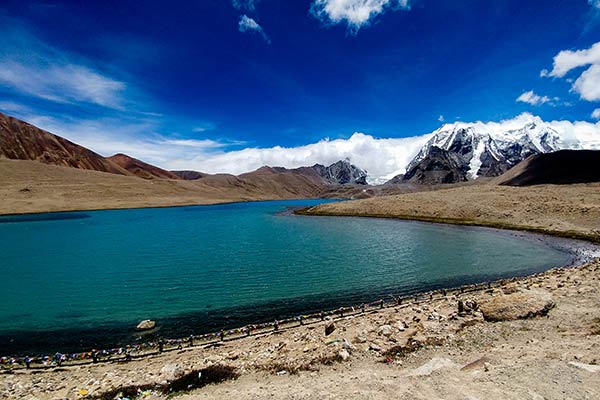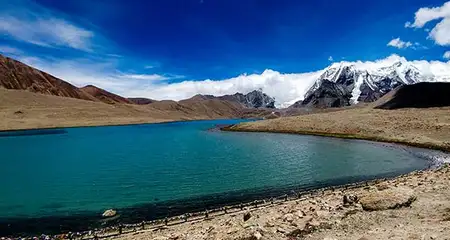Cradled in the lap of the Himalayas, Sikkim is in the north-eastern part of India. The state is blessed with dense woodlands, green meadows, sparkling waterfalls, hot springs, lush tea gardens, and monasteries. This hilly destination is also famous for adventure activities such as trekking, kayaking, and river rafting.
Tourism is one of the major contributors to Sikkim’s economy. According to the Tourism and Civil Aviation Department, 1,375,854 domestic and 49,111 international tourists visited the state in the year 2017. There are many accommodation options across the state including homestays, luxury, heritage, and budget-friendly hotels to accommodate the ever-increasing visitors.
Sikkim Tourism Information
| Capital | Gangtok |
| Official Language | Nepali, Bhutia, English, Hindi |
| Area | 7,096 square kilometer |
| Main Cities | Gangtok, Pelling, Namchi, Jorethang, Ravangla, Rangpo, Lachung, Geyzing, Yuksom, Lachen |
| Status | State |
| Official Tourism Website | http://www.sikkimtourism.gov.in/ |
| Major Railheads | New Jalpaiguri and Siliguri in West Bengal are the two nearest railway stations |
| Airport | Bagdogra Airport in West Bengal is the nearest airport |
History of Sikkim
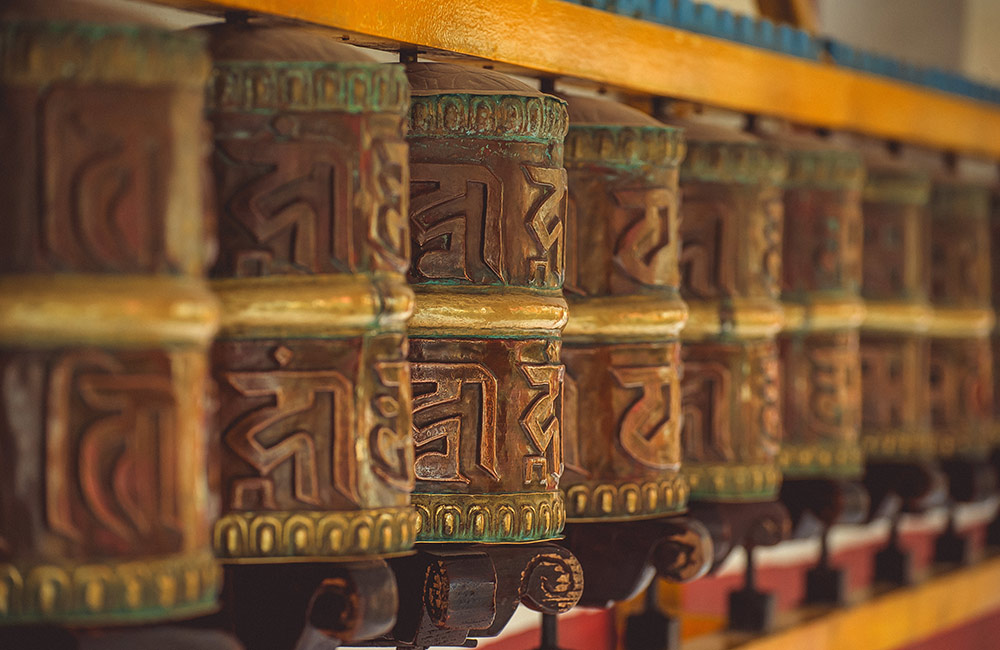
History of Sikkim | Sikkim Tourism
Except for the fact that the Lepchas were the 1st ethnic group to inhabit Sikkim, little is known about Sikkim’s history. The Kingdom of Sikkim was established in 1642 under the rule of Phuntsog Namgyal, a Buddhist priest-king. The kingdom was constantly raided by the Bhutanese and the Nepalese between 1717 and 1733. Repeated attacks from the Nepalese army continued even in the 19th century. This prompted Sikkim to ally with the rulers of British India against Nepal. The kingdom came under British rule in 1890. The state retained its status as an autonomous kingdom even when India gained independence. Sikkim merged with the Indian Republic as its 22nd state in 1975.
Geography & Climate
Sikkim is a landlocked state that shares international borders with Bhutan in the east, Tibet in the north, and Nepal in the west. It is bordered by West Bengal in the south. Situated in the Eastern Himalayas, Sikkim has hilly terrain and dense forests. The landscape consists of streams, glaciers, rivers, hot springs, and high-altitude lakes. Teesta or Tista is the only major river in the state. Kanchenjunga, the third-highest peak in the world, stands on Sikkim’s border along Nepal.
The climate of Sikkim is marked by pleasant summers, freezing winters, and heavy rainfall during monsoon. It experiences regular snowfall in the winter season. March to May and October to mid-December are the best time to visit Sikkim.
Places to Visit in Gangtok
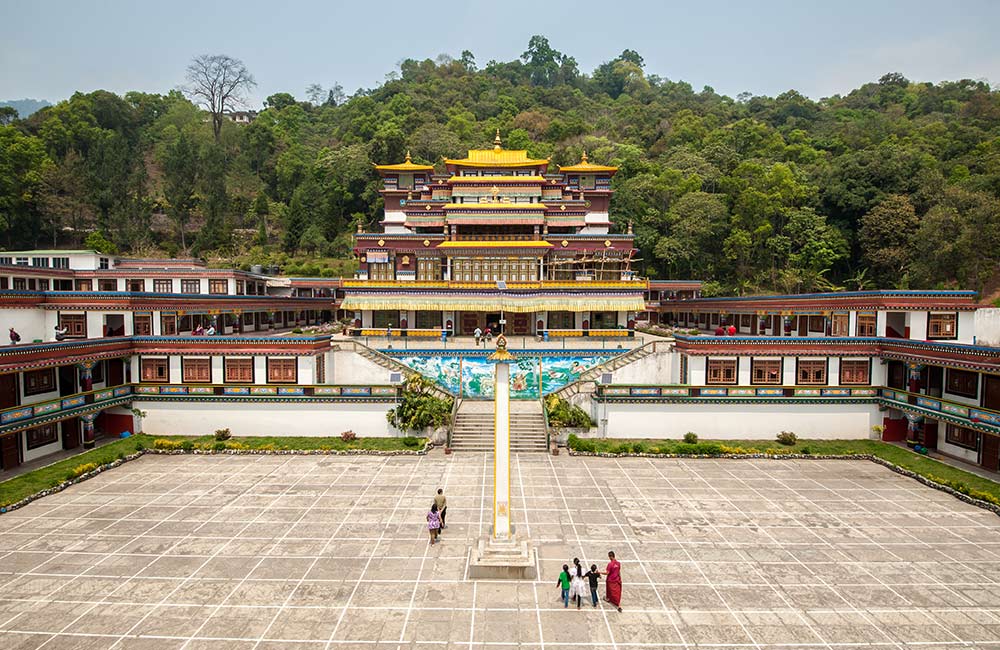
Places to visit in Gangtok | Sikkim Tourism
- Monasteries: Rumtek Monastery, Ranka Monastery, Pemayangtse Monastery, Dubdi Monastery, Kartok Monastery, Enchey Monastery, Tashiding Monastery, Phodong Monastery, and Ralang Monastery
- Temples: Hanuman Tok, Ganesh Tok, Baba Harbhajan Singh Temple, Solophok Chardham Temple Complex, Kirateshwar Mahadev Mandir, Shri Viswa Vinayaka Mandir, Thakurbari Temple
- Lakes: Gurudongmar, Tsomgo, Khecheopalri, Menmecho, Tso Lhamo, Lampokhari Lake, and Samiti Lake
- Hot Springs: Phurchachu, Reshi, Yume Samdong, Ralong, Yumthang, Tarum-chu, and Borang
- National Parks and Wildlife Sanctuaries: Khangchendzonga National Park, Pangolakha Wildlife Sanctuary, Varsey Rhododendron Sanctuary, and Fambong Lho Wildlife Sanctuary
- Caves: Lho Kando Sangphug, Sharchog Beyphugt, Jhang Lhari Nyingphug, and Nub Dechenphug
- Waterfalls: Khangchendzonga Waterfall, Phamrong Falls, Rimbi Waterfalls, Banjhakri Waterfalls, Bhim Nala Falls, Seven Sister Waterfalls, Kyongnosla Waterfall, and Bakthang Falls
- Other Attractions: Nathula Pass, Namgyal Institute of Tibetology, Lachung and the Yumthang Valley, Singshore Bridge, Zero Point, Buddha Park, Do-Drul Chorten, and Tashi Viewpoint
Cuisine of Sikkim

Cuisine of Sikkim | Sikkim Tourism
Sikkimese cuisine comprises of a wide variety of dishes, each of which is filled with a unique flavor. Nepalese cuisine is also quite popular in the state. Rice is the staple item for the locals. Some of the exotic dishes from the state include Momo, Thupka, Thenthuk, Phagshapa, Sha Phaley, Gundruk, Sinki, Dhindo, Yak Cheese, and Tibetan Bread. Sikkim Sael Roti is a sweet item you must try. Chaang is a local alcoholic beverage made from fermented cereals.
Shopping in Sikkim
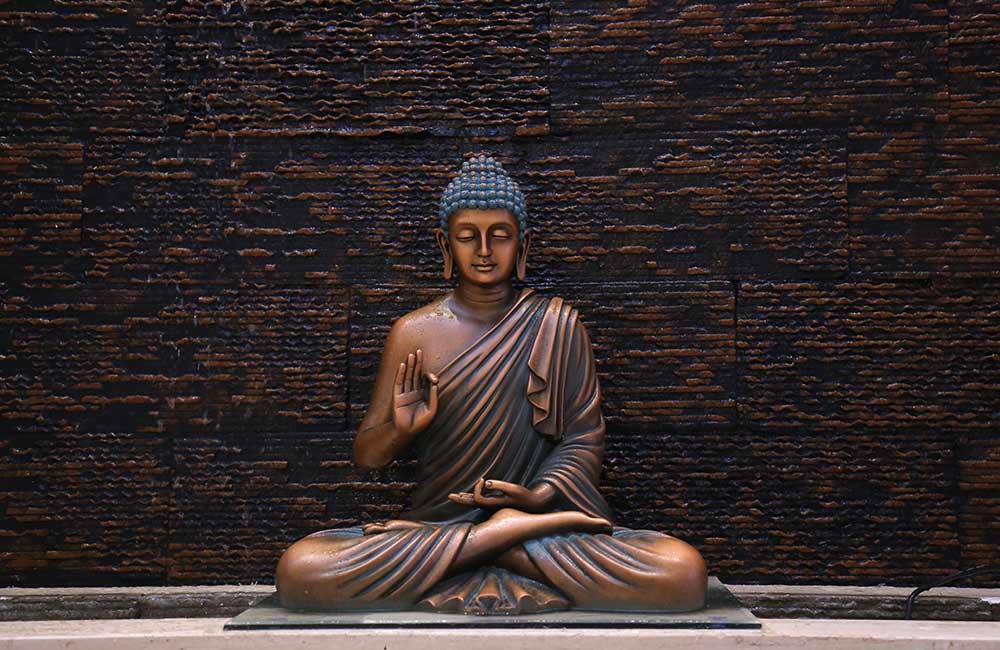
Shopping in Sikkim | Sikkim Tourism
Sikkim has exquisite items you can carry back as souvenirs including:
- Colorful prayer flags
- Canvas wall hangings
- Thangkas or religious scrolls
- Woolen carpets
- Sikkim Tea
- Traditional dress of Sikkim
- Giant masks
- Pickles
- Sikkim Liquor
- Silver Jewelry
- Buddha figurines
- Black cardamom
- Sikkimese cup
- Singing bowls
- Prayer wheels
- Dorjee Bell & Thunderbolt
Things to Do in Sikkim
- Go for trekking
- Enjoy breath-taking views of the snow-capped Kanchenjunga
- Embark on a mountain biking expedition
- Indulge in water-based adventure sports such as canoeing, kayaking, and river rafting
- Challenge the thrill-seeker in you by going for hand gliding and paragliding
- Experience the fun of a yak safari at Tsomgo Lake
- Visit the lush green tea gardens
- Spend some serene moments at the monasteries
- Relish freshly steamed momos and piping hot soups on the streets
- Go for a picnic near one of the splendid waterfalls
- Drive through the Nathu La Pass
- Take in a bird’s-eye view of Gangtok while enjoying a cable car ride
- Shop at the vibrant local markets
How to Reach Sikkim
By Air:
 The nearest airport to reach Sikkim is Bagdogra Airport in West Bengal which offers regular flights from major Indian cities, including Delhi, Kolkata, Mumbai, Bangalore, Hyderabad, and Chennai. It also serves international destinations like Thailand and Bhutan. Sikkim’s only airport is located at Pakyong town near Gangtok. At present, the airport does not have any regular flights as commercial operations were stopped in 2019 due to unpredictable weather conditions.
The nearest airport to reach Sikkim is Bagdogra Airport in West Bengal which offers regular flights from major Indian cities, including Delhi, Kolkata, Mumbai, Bangalore, Hyderabad, and Chennai. It also serves international destinations like Thailand and Bhutan. Sikkim’s only airport is located at Pakyong town near Gangtok. At present, the airport does not have any regular flights as commercial operations were stopped in 2019 due to unpredictable weather conditions.
By Rail:
 Sikkim doesn’t have a railway station of its own. The closest railway stations are the Siliguri Junction (114 km) and the New Jalpaiguri Junction (125 km), both located in the neighboring West Bengal. The two stations are connected to major towns and cities via regular trains.
Sikkim doesn’t have a railway station of its own. The closest railway stations are the Siliguri Junction (114 km) and the New Jalpaiguri Junction (125 km), both located in the neighboring West Bengal. The two stations are connected to major towns and cities via regular trains.
By Road:
 The best way to reach Sikkim is by road. The capital city of Gangtok is connected to Siliguri via NH 31A. The mountain pass of Nathu La connects Sikkim to Tibet. Sikkim Nationalised Transport (SNT) offers bus services throughout the state. Tourist taxis, buses by private operators, and jeep services are the other popular means of transport to travel in and around Sikkim.
The best way to reach Sikkim is by road. The capital city of Gangtok is connected to Siliguri via NH 31A. The mountain pass of Nathu La connects Sikkim to Tibet. Sikkim Nationalised Transport (SNT) offers bus services throughout the state. Tourist taxis, buses by private operators, and jeep services are the other popular means of transport to travel in and around Sikkim.


